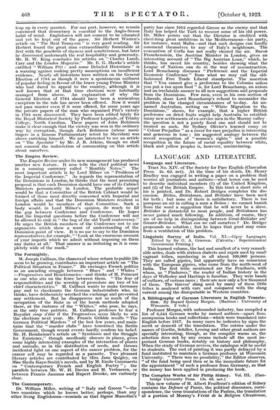The Fortnightly.
M. Joseph Caillaux, the chances of whose return to public life seem to be growing, contributes an important article on "The Political Situation in France." He envisages French politics as an unending struggle between " Blues " and " Whites " --Progressives and Reactionaries—and thinks of M. Poincare
as one who sits on the fence between them. " The fear of responsibilities and the worship of procedure are two of his chief characteristics." M. Caillaux wants to make Germany pay and to checkmate the German industrialists who, he thinks, have deliberately wrecked the exchange and prevented any settlement. But he disapproves not so much of the occupation of the Ruhr as of the harsh methods adopted there, at the instance of the " Whites," who pose, he says, as the only true patriots. M. Caillaux professes to fear a Royalist coup d'ilat if the Progressives seem likely to win the elections next year. Mr. Francis Gribble recalls " The German Political Murders " of the last few years, and main- tains that the " murder clubs " have terrorized the Berlin Government, though recent events hardly confirm his belief. Mr. H. Reinheimer's article on " Symbiosis and the Struggle for Existence," though needlessly obscure in places, gives sonic highly interesting examples of the interaction of plants and animals, as in the distribution of seeds, and throws incidental light on one aspect of the cancer problem, for the cancer cell may be regarded as a parasite. Two pleasant literary articles are contributed by Miss Jane Quigley, on Miss Sheila Kaye-Smith's novels, and by M. Emile Cammaerts on " Contemporary French and English Poetry " ; the parallels between Mr. W. H. Davies and M. Verhaeren, or between Francis Jammes and Rupert Brooke, are curiously close.










































 Previous page
Previous page